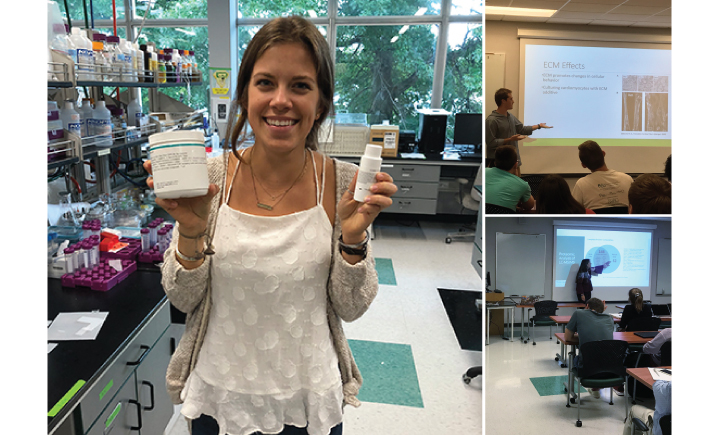Results from undergraduate summer research
Three students from the Department of Biomedical Engineering spent their summer in the lab as part of an NSF-funded REU.

For 10 weeks this summer, the Binghamton University Department of Biomedical Engineering (BME) hosted student researchers as part of the National Science Foundation (NSF) Research Experiences for Undergraduates (REU) in Biomedical Translational Science and Technology Development.
While the students came from a variety of undergraduate institutions, three students accepted to the program were from Binghamton University.
Jacob Gershon was one of the Binghamton students. Gershon worked with Assistant Professor Tracy Hookway on a project titled, “Enhancing the Formation of Cardiac Microtissues Using Extracellular Matrix.”
Gershon and Hookway spent the summer working on fabricated cardiac tissue with the overall goal of increasing the maturity of the tissue.
“Cardiac tissue is created from stem cells, which means that the heart cells are not as advanced as adult heart tissue,” explained Gershon. “The project we worked on was dedicated to finding a way to mature those heart cells so they would be closer to adult cardiac tissue.”
They used extracellular matrix additives to test if that would improve the formation of engineered tissue. They found that the cells with a medium concentration of the additive formed more completely, but more research is needed to fully mature the cardiac cells.
Emma Northrup also spent her summer doing research as part of the REU. Northrup worked with Assistant Professor Guy German on a study titled, “Mechanoresponsive Spontaneous Wicking for Lubrication and Drug Delivery.”
The study looked at how microchannels on the surface of the skin wick away fluids like sweat with the intention of recreating that process on silicone surfaces.
“Being able to wick away fluids may help advance the design of biomedical sensors and other types of devices,” explained Northrup.
They found that the fluid used (a mixture of ethanol) changed the angle. It did not stop wicking from occurring, but did cause the observed phenomenon to vary over time. To correct for this, they will carry out future studies with a fluid that has a higher evaporation point and uniform concentration (water).
Margaret Blystone, a junior biomedical engineering major, was also involved in the summer REU. She said the program was “a phenomenal experience, I can’t speak highly enough about. I met so many great people in my field and I’m looking forward to meeting up with them again at the BMES conference in Atlanta.”
Blystone worked in Associate Professor Sha Jin’s lab doing proteomic (protein) analysis on the pancreatic extracellular matrix to see if there was a useful difference in the composition of male and female samples.
“The overall goal is to eventually get to a place where we can regenerate pancreatic islets so that patients with diabetes can be treated by a transplantation of endocrine cells,” explained Blystone.
Blystone is still working in Jin’s lab this year and will continue to help where she can with the project. She said the summer REU was a great way for her to dedicate time from her busy schedule to the lab work she really wants to be doing.

